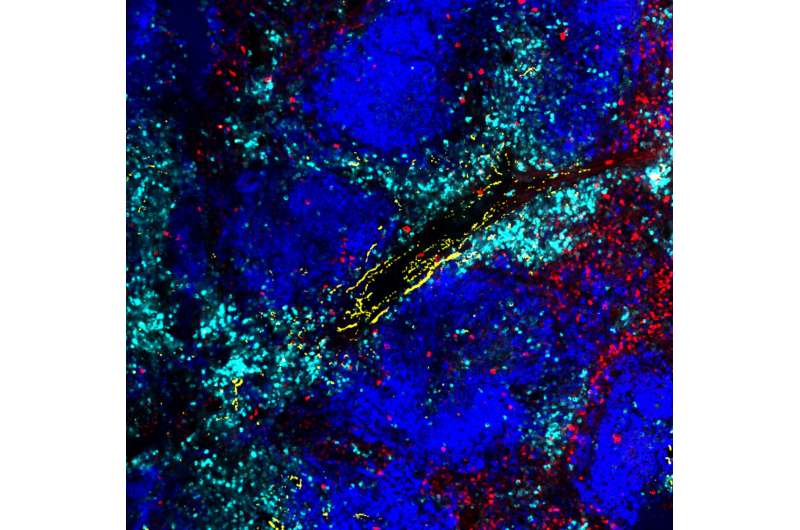This article has been reviewed according to Science X's editorial process and policies. Editors have highlighted the following attributes while ensuring the content's credibility:
fact-checked
peer-reviewed publication
trusted source
proofread
Reducing stress on T cells makes them better cancer fighters

Even for killer T cells—specialized immune cells—seeking and destroying cancer cells around the clock can be exhausting. If scientists can understand why killer T cells become exhausted, then they can create more resilient cancer-killing cells.
In a new study, Salk Institute scientists discovered a relationship between killer T cell exhaustion and the body's sympathetic stress response ("fight-or-flight") in varying cancer types in mouse and human tissue samples. The team also found that the interaction between killer T cells and sympathetic stress response hormones can be inhibited with beta-blockers—a class of drugs already used in humans for controlling blood pressure and heart rate—to create killer T cells that fight the tumor more efficiently.
The findings, published in Nature on September 20, 2023, establish a new link between the sympathetic stress response and how the immune system responds to cancer. Additionally, they demonstrate the benefit of pairing beta-blockers with existing immunotherapies to improve cancer treatment by bolstering killer T cell function.
"There is no question immunotherapy has revolutionized cancer patient treatment—but there are many patients for whom it's ineffective," says Professor Susan Kaech, senior author and director of Salk's NOMIS Center for Immunobiology and Microbial Pathogenesis. "Finding that our nervous system can suppress the function of cancer-destroying immune cells opens up entirely new ways to think about how to rejuvenate T cells in tumors."
The sympathetic nervous system is responsible for mediating the body's stress response, also known as the fight-or-flight response. However, little was known about how the nerves regulate the immune response to infections or cancer.
The researchers focused on sympathetic nerves that innervate our organs and produce the messenger hormone noradrenaline, which is also a stress hormone. The scientists used a variety of cancer and chronic illness models in mice and human tissue samples to study when and how killer T cells are influenced by the sympathetic nerves.
They found that the sympathetic nerves were producing noradrenaline, which was binding to killer T cells using a receptor called ADRB1. Exhausted killer T cells expressed more ADRB1 receptors than their functional counterparts, allowing the T cells to "listen" to the noradrenaline released by the nerves.
To test whether killer T cell exhaustion could be prevented, the researchers tested two approaches to intercepting noradrenaline and ADRB1 interaction: either removing ADRB1 altogether or impairing ADRB1 function with beta-blockers, which resulted in more-functional killer T cells that were better at destroying cancer cells.
The authors also found that the exhausted T cells do not just listen to nerves from afar, but cluster right around them in tissues. Surprisingly, the ADRB1 receptor provided the T cells with critical instructions to migrate near the nerves, which in turn suppressed their functions—making them worse at fighting cancer.
"The innervation of tumors is an understudied area of tumor immunology. Our study has now uncovered that nerves contribute to the process of T cell exhaustion in tumors, where T cells become worn out and less powerful in their fight against the tumor over time," says first author Anna-Maria Globig, a postdoctoral researcher in Kaech's lab. "If we can unravel the details of how nerves suppress the body's immune response to cancer and why the exhausted T cells move towards the nerves, we can begin to target this process therapeutically."
According to Kaech, the researchers hope to expand their understanding of the exhausted killer T cell environment to learn more about why stress makes us sicker.
"We were able to find a new pathway that we can target with beta-blockers to create more resilient killer T cells that resist exhaustion and fight cancer better," says Globig.
Since beta-blockers are already clinically used, the team also hopes to implement their proposed cancer-fighting regimen soon in patients with lung cancer. By partnering with clinicians, they hope to study more human cancer tissue samples to enrich their findings and provide further evidence of the efficacy of beta-blockers in cancer treatment.
More information: Susan Kaech, Beta-1 Adrenergic Receptor links sympathetic nerves to T cell exhaustion, Nature (2023). DOI: 10.1038/s41586-023-06568-6. www.nature.com/articles/s41586-023-06568-6


















